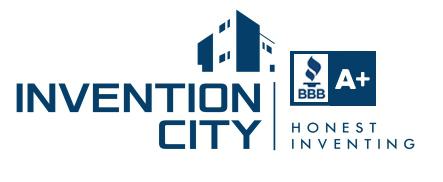
Step 2: Guard Your Wallet
Listen to the Invention City podcast
You probably saw the ads on late night TV or heard them on the radio. “Do you need help with your invention? Call 800-123-4567 and get your free inventor’s kit.” These ads sell invention development services. There is nothing wrong with that… except that the services that some of these companies sell may be one step shy of completely worthless. Such services are typically...
- Sold to everyone regardless of the quality or feasibility of an idea. These companies have never seen an idea that did not hold promise. Remember, they want to sell you services so they will tell you that your idea for a square wheel is brilliant and has real commercial potential.
- Too cheap to be effective. The process of commercializing an invention is expensive. A relatively simple idea can cost between $100,000 to over $1,000,000 to move from idea stage to market introduction. These companies claim they can do the job for roughly $10,000. Unfortunately there is no free lunch and doing a decent job often costs far more than $10,000. The truism, “you get what you pay for” is accurate. And it gets worse. If you do not have the $10,000 to pay for services some companies will loan you the money from their own finance company. You can end up not only wasting money, but also end up in debt with your good credit ruined.
- Include patent services. The cost of getting a decent mechanical patent alone is typically around $10,000+ when all is said and done. And the patent is the last thing to consider. If a company sells you on patent services before prototype services, or other services that help you develop and evaluate your invention you should probably begin to walk away FAST.
- Have no track record of success. The number of inventions these companies actually bring to market is pathetically small. These companies make money by selling services, not through commercial success. They don’t care if your invention succeeds.
There are legitimate and honorable invention service companies. Some companies work on a fee for service basis. Others may not charge a fee but may take a hefty percentage of the proceeds from success (50% is not uncommon). Keep in mind that even when you find negative comments about a service company those comments may reflect the feelings of an Inventor who spent a lot of money on a bad idea rather than a problem with the services of the company. Also keep in mind that even if an invention has all of the characteristics necessary for success that success is not assured. Market factors, personalities, and plain old luck matter a lot more than they should.
How do you know if the company you are considering is honorable? Ask for success stories and references. Do an online search of the company’s name with Google and see what comes up. But beware that any review you read online may be inaccurate for any number of reasons. Finally, if the deal they’re offering sounds too good to be true it probably is.
A penny saved IS a penny earned.
A primary goal of inventing is to make money. Throughout the inventing process you will have many opportunities to spend money. Remember the adage, “A penny saved is a penny earned.” Do not invest a penny unless you believe you will get a good return on your investment. Most inventions fail. This is true for both successful and unsuccessful inventors. Successful inventors spend their investment money carefully so they can pursue a number of ideas – eventually one of those ideas will be a winner. Unsuccessful inventors often spend all of their money on one idea – if that idea fails, they have no money left for pursuing another even better idea.
Think like a venture capitalist
Venture capitalists (VCs) bet on new technologies. Independent inventors do exactly the same thing. One big difference is that VCs place such bets professionally. A VC’s definition of success is return on investment. Inventors who want to make money should think similarly.
When evaluating an investment a VC uses the following rule of thumb. An investment must have a good chance of returning at least:
- 5X the investment within 3 years or…
- 10X the investment within 5 years
A typical VC invests in 10 companies with the expectation that 1 or 2 will be home runs and exceed their investment goals; 2-3 will break even or maybe make a little money and; 5-7 will lose money.
Will your invention make you 5X to 10X your money within 3-5 years? Maybe your money would be better off in a bank. The money you invest in your invention could safely double within 8-20 years (depending on interest rates) – that is money that could be very useful when you retire.
No one else cares about your money as much as you do. Your odds of succeeding with an invention submission organization is slimmer than winning at a casino.
share this article: facebook
